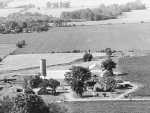Down on the farm

Charlie Johnson never thought he would do anything but farm.
"There's always a great satisfaction at the end of the day when you're working in the fields and you can turn around and see where you've been, when you can see the earth that's been tilled behind you," said the Nevada-born Johnson.
The Johnson family farm, located just northwest of Moundville, was 800 acres at it largest. The family grew corn, soybeans, milo, wheat and at times oats and barley.

Johnson's niece, Monica Johnson, remembers visits to the farm as a child.
"I grew up in Jefferson City, which wasn't a big town, but it wasn't a rural community," she said. "I loved going to the farm, but I never thought, 'I'm going to become a farmer."
Monica moved to New York City to attend the New School -- a legendary university founded in 1919 -- and she began writing for different food publications.

"I just wanted to live in a big city, and I have," Monica said. "For a long time I didn't really want to acknowledge my personal past."
A conversation with her father, who grew up on the family farm, about raw milk changed that.
"I called my Dad and I was like, 'Did you grow up drinking raw milk?' We ended up talking for three hours on the phone," she said. "He started sharing stuff about all these aspects of growing up. I was hearing things I had never heard before. It was during that conversation that I realized how interesting it was to me, and probably how it's really not that unique of a story."

Monica plans to write the history of the Johnson farm and tie it to current issues in agriculture.
"I figured a lot people could relate to the plight of the Johnson family farm," she said.
The youngest of four, Charlie Johnson started working on the farm at a very early age.
"I just kind of grew into it," he said. "When I first started, my grandfather was still alive as well. Immediately out of high school, I started farming with my father."
He continued to farm while he earned his associate's degree at Fort Scott community college. He then enrolled at University of Missouri-Columbia.
"I was enrolled, I had my books purchased, and a friend and I were going to rent an apartment together," he said. "I was literally moved up there and ready to start. "My father had a debilitating stroke, and I immediately came home to assume the farming operation."
Altogether, Charlie farmed for 14 years.
"I found it to be overwhelming for one person, he said. " I think back to whenever I was farming with my father and kept thinking, 'I wish he would just leave me alone and let me do it.'
"'After he died, I would think, 'I wish he was here to tell me what to do,'" Charlie said, his eyes filling with tears.
Piece by piece, Charlie had to sell the farm.
"I went broke," he said. "I had to move to town. I had to find other employment."
Now a supervisor in the Department of Economic Development, Charlie works in Nevada and lives in a suburb of Kansas City.
"I truly have moved to the city," he said. "Still, I'm an old farm boy at heart."
Charlie said Nevada is a prime example of the importance agriculture plays in rural communities. "(Nevada) is truly an agrarian-based community. Certainly, we have business and industry. But, the biggest industry is farming," he said. "It is ranching. If the farmers and ranchers don't make it, it affects the entire community."
Monica said learning her family's history has taught her how to listen.
"I've learned that I really don't know as much as I think I know. I've learned how important the past is to the present," she said. "There's such a rich past in America, and our farming culture is amazing. I don't think our story is unique. I think it's something a lot of people can tap into. I think one of the things I've learned is how rich and powerful our past can be."
